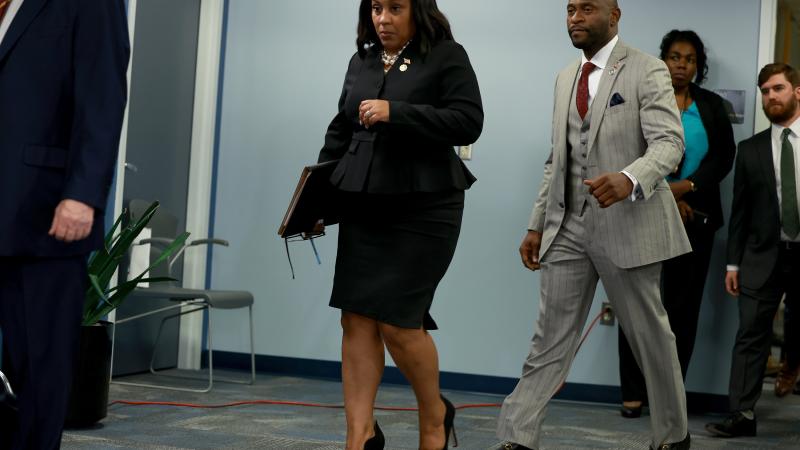DOGE duo meets skeptical Congress as they vow $2 trillion in spending cuts
“We did not go through any list of cuts or anything like that. We didn’t get into that,” Sen. Susan Collins, R-Maine, told the New York Times.
Elon Musk and Vivek Ramaswamy were on Capitol Hill this week to outline their plans for massive reductions in federal spending and headcount, where they met with a skeptical Congress and came face-to-face with the real limitations of their thus-far-nebulous purview.
The pair initially outlined their plans to rely heavily on executive actions from President-elect Donald Trump in a Wall Street Journal op-ed in late November. Trump’s authority, however, will focus on the elimination of redundant and unnecessary regulations. The pair cited the recent Supreme Court ruling that eliminated the "Chevron Doctrine" as a blueprint for rolling back regulations Congress did not authorize.
Spending reductions, however, will fall to Congress to approve.
Trump has yet to outline the exact powers of the Department of Government Efficiency (DOGE) that Musk and Ramaswamy will co-lead, leaving many unsure as to what they will be able to accomplish beyond making ambitious recommendations. The department is expected to work closely with the Office of Management and Budget, but its own purview, again, remains unclear.
The Thursday meeting evidently remained “fairly general,” according to Rep. Tom Cole, R-Okla., who spoke to The Hill afterwards. “It’s just ‘getting to know you’ and trying to understand the full scope of what they’re going to propose, how much would be done by executive action.”
“We did not go through any list of cuts or anything like that. We didn’t get into that,” Sen. Susan Collins, R-Maine, told The New York Times.
Complicating the prospect of making their proposed $2 trillion in cuts are the twin-problems of the narrow House majority and the Senate filibuster, which will make substantive financial overhauls difficult to send to Trump’s desk.
The DOGE leaders also hope to avoid tackling entitlements, which has more than a few Republican lawmakers skeptical that they could reach their spending cut targets, even on paper. Nonetheless, lawmakers appear eager to work with the pair on accomplishing the longtime conservative goal of reducing the size of the federal government.
Legislative support
House and Senate Republicans have already created respective DOGE caucuses dedicated to working with the new federal department. In the upper chamber, Sen. Joni Ernst, R-Iowa, leads the bloc of lawmakers, making for an interesting dynamic as she faces pressure to support Trump’s nominees and Musk has threatened to back primary challengers to those who oppose them. So far, however, no direct tensions between Musk and Ernst have emerged.
Another member of the DOGE caucus, Sen. Marsha Blackburn, R-Tenn., has taken the initiative on the agenda and is preparing a string of proposals dubbed the “DOGE Acts” to support Musk and Ramaswamy. "My DOGE Act will freeze federal hiring, begin the process to relocate agencies out of the D.C. swamp, and establish a merit-based salary system for the federal workforce," she said Thursday.
Some Democrats have expressed a willingness to work with the department as well. Rep. Jared Moskowitz, D-Fla., told CBS News "I think Democrats should embrace government efficiency…That doesn't mean that we're going to start cutting services, but I think it can be more efficient."
Targeting headcount
Spending provisions aside, one clear strategy of the DOGE group will be to require federal employees to show up to work in-person, with the expectation that the change would lead to large-scale resignations, after which Congress could conceivably update the budget to reflect the drop in payroll without as much fuss.
A report from Ernst’s office this week found that only 6% of federal employees “report in-person on a full-time basis” while roughly one in three are fully remote, according to The New York Post. Musk, for his part, highlighted that the exclusion of maintenance and security staff brought the figure to roughly 1%.
One of Blackburn’s bills would require employees to work in-person and also create a commission for relocating federal agencies out of D.C., another approach that may reduce headcount by encouraging resignations.
Entitlements "off limits" has lawmakers skeptical
Trump heavily emphasized during the campaign that he did not want to cut Social Security or Medicare and both programs, as well as other federal entitlements, are not set to be a part of DOGE’s $2 trillion cut proposals.
“The first thing that was talked about was protecting the American people’s hard-earned money and Social Security,” Rep. Marjorie Taylor Greene, R-Ga., said after the meeting. House Oversight Committee Chairman James Comer, R-Ky., confirmed in late November that Greene would lead a subcommittee dedicated to working with DOGE.
Along with the military, the two programs make up a large portion of federal expenditures and the hands-off approach to them will leave Musk and Ramaswamy with far less room to maneuver on cuts to reach their target amount.
One GOP member present, however, told The Hill that deficit spending would persist so long as Republicans refused to touch entitlement reform.
Cautious optimism
While the logistics remain unplanned, lawmakers generally concur that the public wants a cleaner, more efficient government and are willing to at least begin the discussion. Some, however, insisted that public pressure on Congress would be necessary to see them actually follow through.
“I told these guys, the best thing they could do is highlight all of the nonsense that Congress continues to fund, and then that way Congress has to bear its burden as appropriators and spenders with the power of the purse,” Rep. Chip Roy, R-Texas, told the Times.
“The federal government is far too large and inefficient. The American taxpayers deserve better,” House Speaker Mike Johnson posted on X. “[The House GOP] is excited to work with [Elon Musk], [Vivek Ramaswamy] and [DOGE] for a leaner, more efficient government.”















